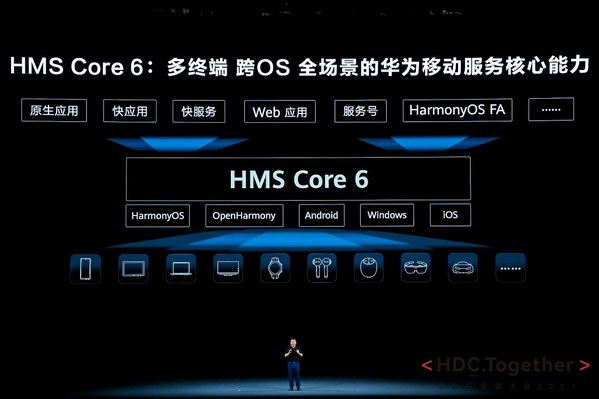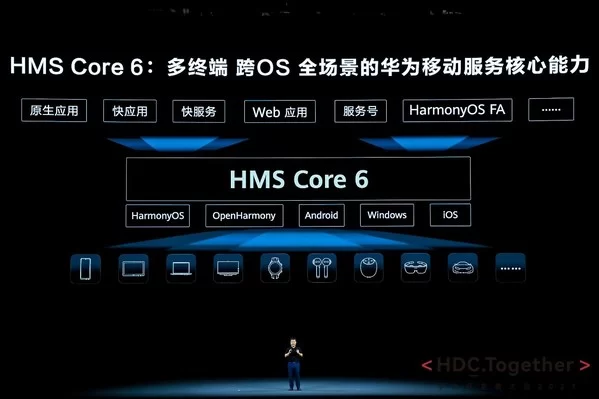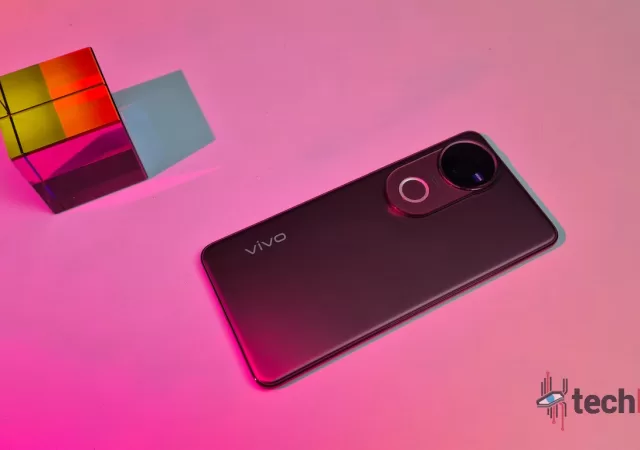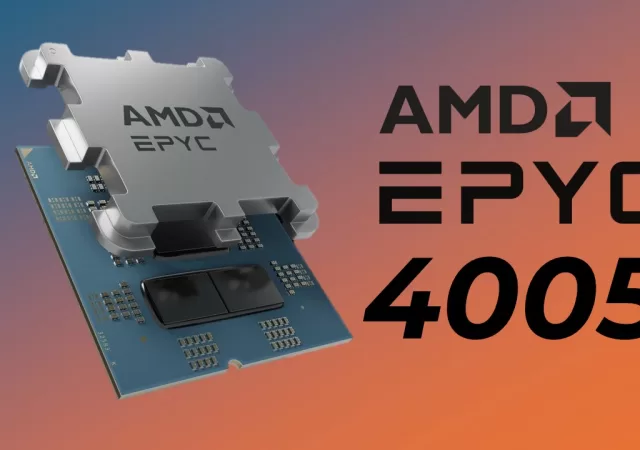Latest HMS Core updates will help global developers to build an ecosystem for the intelligent world
DONGGUAN, China, Oct. 23, 2021 — Today at its annual Huawei Developer Conference 2021 (HDC 2021), Huawei announced plans to enhance developer support with updates to its Huawei Mobile Services (HMS) capabilities. The updated tools on offer will empower developers to create improved consumer experiences and offer a choice of even better, more competitive services to users.
As part of the keynote delivered by Zhang Ping‘an, President of the Consumer Cloud Service, Huawei Consumer Business Group, CEO of Huawei Cloud BU, titled "Together to Build a New HMS Ecosystem", he shared that there are now 5.1 million global developers registered with HMS who have integrated over 173,000 applications with HMS Core. HMS now houses over 580 million monthly active users with over 1 billion devices connected. He also revealed the latest HMS Core 6 kits and updates to HMS’ five core engine services to help developers meet the growing need for intelligent app functions.
"Innovation is key to building ecosystems of the future and developers are at the core of it. Huawei hopes to bring together both its open and innovative capabilities, as well as the wonderful minds of developers, to accelerate our journey towards the interconnected, all-scenario future," said Zhang Ping‘an.
HMS capabilities continue to develop at lightning speed with global developers’ support
In 2018 when AppGallery and HUAWEI Music were first available overseas, HMS only had 560,000 registered developers globally. With HMS Core 4 being made available in 2019 as Huawei announced its plan to build a global mobile ecosystem, 1.3 million developers joined hands with HMS and made use of its 14 core capabilities. By 2020, HMS Core 5 brought about 56 capabilities across 7 categories, as well as five core engine services to 2.3 million registered developers globally. Now, the HMS ecosystem continues to have a firm standing as the third largest mobile ecosystem in the world.
In the first three quarters of this year, AppGallery distributed over 332.2 billion applications globally to Huawei’s 730 million end users – a 13% increase year-on-year. Quick Apps distribution also exceeded 11.5 billion, representing an 188% increase year-on-year.
Cross platform capability of HMS Core 6 empowers developers to enhance their apps
HMS Core 6 has announced several new kits for developers to help them to create more competitive functions for their apps following its launch in July. It offers a total of 69 Kits and 21,738 APIs. Compared to HMS Core 5, the latest release features 13 cross-operating systems open capabilities and 8,747 new APIs.
The AV Pipeline Kit, 3D Modelling Kit, Video Editor Kit, Audio Editor Kit and 5G Modem Kit are among some of the recently launched Kits available to developers, supporting those in the media, graphics, artificial intelligence (AI), copyright protection and system domains. Huawei also upgraded the existing services, such as Computer Graphics Kit and Network Kit, to meet the growing need for intelligent app functions and further empower its partners.
In the media domain, HMS Core 6 opens up 11 capabilities in total, adding new video and audio editing capabilities. Video Editor Kit is a one-stop toolkit that can be easily integrated into an app, equipping it with versatile video editing functions like video import/export, editing, rendering, and media resource management. Its powerful, intuitive, and compatible APIs let developers easily create a video editing app for diverse scenarios. Audio Editor Kit provides a wide range of audio editing capabilities, including audio source separation, spatial audio, voice changer, noise reduction, and sound effect. This serves as a one-stop solution for developers to create audio-related functions in their apps at a lower cost with ease.
In the graphics domain, HMS Core 6 has added or enhanced 7 open capabilities, with the 3D Modelling Kit being the highlight. This AI-based kit supports one-click photo collection and automatic 3D model generation, which increases model production efficiency with minimal professional experience required. Additionally, the Computer Graphics Kit has debuted the "volumetric fog" rendering technique. This new graphics feature uses the real-time ray tracing feature of Scene Kit to make the dynamic reflection of mobile game objects more realistic. The AR Engine environment light tracking supports real-time Ambient light to enhance the shadowing fog effects, something especially useful for cyberpunk-style games.
For AI, Huawei introduced SignPal Kit. This kit converts text into sign language gestures and facial expressions in real time with over 90% accuracy, benefiting those with hearing loss and making communication barrier-free for them.
The full range of HMS Core capabilities empowers developers to create quality apps with its intelligence, contextual and scenario-based solutions across multiple smart devices including smartphones, tablets, smart TVs, wearables and audio products. These open capabilities can also be used to create apps running on Android, HarmonyOS and iOS by using cross-platform development frameworks such as React Native and Cordova.
Updates to HMS core engine services encourage intelligent app functions
To meet the growing demand of its users and developers, and to continue to push the boundaries of intelligent app functions, Huawei announced new updates to its HMS Core engine services through Huawei Cloud’s aPaaS service.
Zhang Ping‘an added, "Our goal is to update these core engines into cloud services to better serve global developers."
Petal Search and Petal Maps Platform will both receive updates over the coming months and will be available to developers as a cloud service, demonstrating the commitment to providing developers with the most innovative tools.
Huawei has brought state of the art updates to its well-loved Petal Search; Petal Search 2.0 will be the next-generation AI multi-modal search engine, offering an innovative search experience in over 20 different industries including news, videos, shopping, flights, local businesses and more. As well as supporting over 70 languages, Petal Search is available in 170 countries across the world.
With Search as a Service, Huawei fully opens Petal Search capabilities through the device-side SDK and cloud-side APIs, enabling ecosystem partners to quickly provide the optimal mobile app search experience. With an average of 8 billion searches per day, Petal Search allows partners to efficiently distribute content to users through Huawei’s proprietary UniBox management platform.
Petal Maps is another example of Huawei technology helping developers to meet the high standards of Huawei users. Today’s conference reflected on how Petal Maps has collected more than 260 million pieces of POI information (up from 180 million) and 690 million addresses (up from 470 million), assisting developers to meet the positioning requirements across new scenarios. Available in over 140 countries and regions, Petal Maps was awarded with the Red Dot Design Award for its interactive experience and now has an estimated 10 million cumulative users.
Petal Maps’ upgrade will see the platform equipped with even more capabilities, including high-precision positioning, topographic map display, diversified map interactive experiences, in-depth data search, high-quality lane-level guidance and Map Studio. To make the platform even better for developers, Petal Maps Platform included flyTo to its map display so developers can customize their map requires for users to enjoy a more realistic and immersive search experience. Map Studio is now available for overseas developers so that they can customise maps with custom templates and style editor tools. The platform is also offering new and improved privacy features, with Huawei committed to protecting its users’ data.
Today’s annual HDC 2021 gave Huawei the chance to re-establish commitment to its developers, showing the adaptations it can make to ensure its services remain innovative and exciting.







